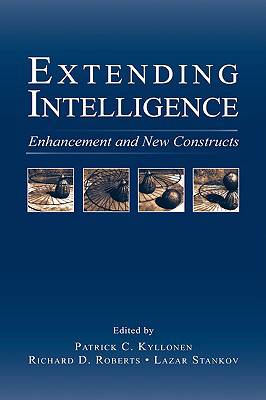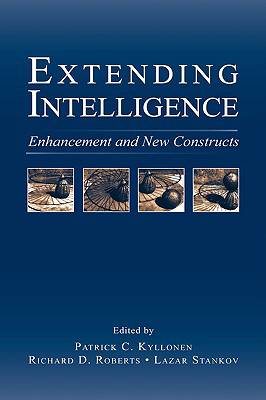
Bedankt voor het vertrouwen het afgelopen jaar! Om jou te bedanken bieden we GRATIS verzending (in België) aan op alles gedurende de hele maand januari.
- Afhalen na 1 uur in een winkel met voorraad
- In januari gratis thuislevering in België
- Ruim aanbod met 7 miljoen producten
Bedankt voor het vertrouwen het afgelopen jaar! Om jou te bedanken bieden we GRATIS verzending (in België) aan op alles gedurende de hele maand januari.
- Afhalen na 1 uur in een winkel met voorraad
- In januari gratis thuislevering in België
- Ruim aanbod met 7 miljoen producten
Zoeken
Extending Intelligence
Enhancement and New Constructs
Patrick C Kyllonen, Richard D Roberts, Lazar Stankov
€ 85,45
+ 170 punten
Uitvoering
Omschrijving
This volume presents research from a variety of perspectives on the enhancement of human intelligence. It is organized around five themes - enhancement via instruction; enhancement via development (over the life cycle); enhancement over time; enhancement via new constructs; and new directions in enhancement.
Three key issues are addressed:
- First, although most of the scientific research on intelligence has concerned what it is, this volume attends to the consequential societal and economic issue concerns of whether it can be increased, and how.
- Second, intellectual enhancement is particularly important when targeted to minorities and the poor, groups that have typically performed relatively less well on intelligence and achievement measures. This volume reflects the education community's ongoing interest in understanding, and attempting to close, achievement or test score gaps.
- Third, most of the attention to examining intellectual enhancement, and in accounting for and closing the test-score gap, has focused on general cognitive ability. In line with the current emphasis on considering intelligence from a wider perspective, this volume includes constructs such as emotional and practical intelligence in definitions of intellectual functioning.
Extending Intelligence: Enhancement and New Constructs is an essential volume for researchers, students, and professionals in the fields of educational psychology, intelligence, educational measurement and assessment, and critical thinking.
Specificaties
Betrokkenen
- Auteur(s):
- Uitgeverij:
Inhoud
- Aantal bladzijden:
- 408
- Taal:
- Engels
- Reeks:
Eigenschappen
- Productcode (EAN):
- 9780805845044
- Verschijningsdatum:
- 1/11/2007
- Uitvoering:
- Hardcover
- Formaat:
- Genaaid
- Afmetingen:
- 163 mm x 232 mm
- Gewicht:
- 771 g

Alleen bij Standaard Boekhandel
+ 170 punten op je klantenkaart van Standaard Boekhandel
Beoordelingen
We publiceren alleen reviews die voldoen aan de voorwaarden voor reviews. Bekijk onze voorwaarden voor reviews.









